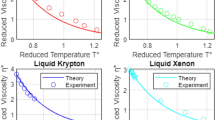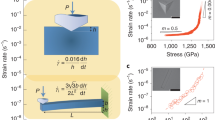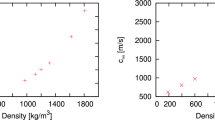Abstract
As is well known, the viscosity of gases and its variation with temperature has received a satisfactory explanation on the basis of molecular theory. Little progress has, however, been made towards explaining the phenomena of the viscosity of condensed media—that is, of liquids and solids from a molecular point of view. What is evidently required is a working hypothesis which will indicate why, when a substance passes from the state of vapour to that of liquid, its absolute viscosity is greatly increased but diminishes with rising temperature, while that of the vapour increases in the same circumstances. I propose in this note to put forward briefly the outline of a theory which appears to have claims to serious consideration, as it indicates a quantitative relation between the viscosity of a liquid and of the corresponding vapour which is supported by the experimental data.
This is a preview of subscription content, access via your institution
Access options
Subscribe to this journal
Receive 51 print issues and online access
$199.00 per year
only $3.90 per issue
Buy this article
- Purchase on Springer Link
- Instant access to full article PDF
Prices may be subject to local taxes which are calculated during checkout
Similar content being viewed by others
Author information
Authors and Affiliations
Rights and permissions
About this article
Cite this article
RAMAN, C. A Theory of the Viscosity of Liquids. Nature 111, 532–533 (1923). https://doi.org/10.1038/111532b0
Issue Date:
DOI: https://doi.org/10.1038/111532b0
This article is cited by
-
Thermal Management in the Air Intake System of Combustion Engines
MTZ worldwide (2014)
-
Thermomanagement im Luftsystem von Verbrennungsmotoren
MTZ - Motortechnische Zeitschrift (2014)
-
Viscosity Arrhenius Activation Energy and Derived Partial Molar Properties in 1,4-Dioxane + Water Binary Mixtures from 293.15 to 323.15 K
Journal of Solution Chemistry (2012)
-
Viscous behaviour of glass-forming liquids: a thermodynamic approach
Bulletin of Materials Science (1996)
-
Examination of molecularly scattered light with a Fabry-Perot Etalon
Proceedings of the Indian Academy of Sciences - Section A (1935)
Comments
By submitting a comment you agree to abide by our Terms and Community Guidelines. If you find something abusive or that does not comply with our terms or guidelines please flag it as inappropriate.



